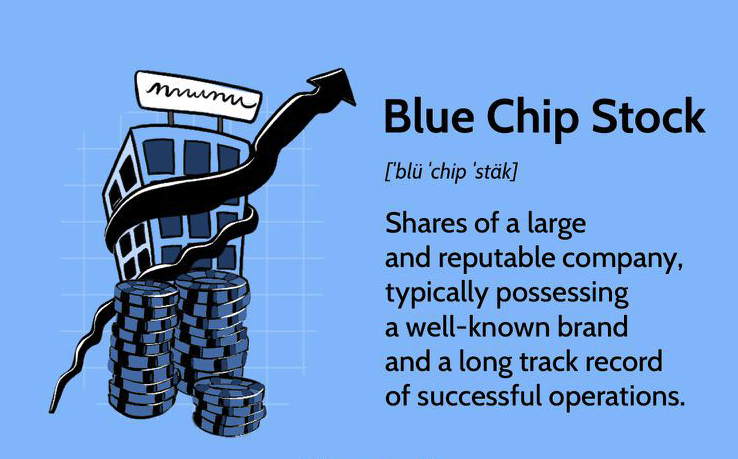What Is a Blue Chip Stock?

A blue chip stock is stock issued by a large, well-established, financially-sound company with an excellent reputation. Normally, such companies have operated for many years, have dependable earnings, and usually pay dividends to investors.
A blue chip company typically has a market capitalization in the billions. It’s generally the market leader or among the top three companies in its sector, and, more often than not, is a household name.
For all of these reasons, blue chip stocks can make good investments and are among the most popular stock purchases for investors. Some examples of blue chip stocks are IBM Corp., Coca-Cola Co., Microsoft, American Express, McDonald’s, and Boeing Co.
Understanding a Blue Chip Stock
While dividend payments are not absolutely necessary for a stock to be considered a blue chip, most blue chips have long records of paying stable or growing dividends.
A blue chip stock is generally a component of the most reputable market indexes or averages, such as the Dow Jones Industrial Average, the Standard & Poor’s (S&P) 500, and the Nasdaq-100 in the United States, the TSX-60 in Canada, or the FTSE Index in the United Kingdom.
How big a company needs to be to qualify for blue chip status is open to debate. A generally accepted benchmark is a market capitalization of $10 billion, although market or sector leaders can be companies of all sizes.
For example, the T. Rowe Price Blue Chip Growth Fund doesn’t have a specific guideline for what type of company qualifies outside of its focus on large-cap and mid-cap companies that are well-established in their industries. Its top ten holdings have market capitalizations that range from over $670 billion (Tesla) to over $2.4 trillion (Microsoft).

The Safety of Blue Chip Stocks
Blue chips are considered safe investments due to their longstanding financial stability. They may have survived difficult challenges and market cycles over the years. However, the bankruptcies of General Motors and Lehman Brothers, as well as a number of leading European banks during the global recession of 2008, are proof that even the best companies may struggle—and even fail—during periods of extreme stress.
Are Blue Chips Good Investments?
Whether or not blue chip stocks (or any other securities) represent a good investment depends on an investor’s financial needs, investment objectives, diversification goals, risk tolerance, and investment style.
Nonetheless, blue chips can play an important role in a portfolio. They provide a useful combination of growth and value characteristics that can balance the ups and downs caused by economic distress and market volatility.
The companies are consistent, top performers with solid fundamentals. And income from dividends is usually dependable. Reinvesting dividends harnesses the power of compounding, which is always a plus.
Blue Chips as Part of a Larger Portfolio
While blue chip stocks are appropriate for use as core holdings within a larger portfolio, they generally shouldn’t be the entire portfolio. A diversified portfolio usually contains some allocation to bonds and cash. Within a portfolio’s allocation to stocks, an investor should consider owning mid-caps and small-caps as well.
Younger investors can generally tolerate the risk that comes from having a greater percentage of their portfolios in stocks, including blue chips, while older investors may choose to focus more on capital preservation through the addition of investments in bonds and cash.
What Makes a Company a Blue Chip?
Blue chip stocks are the titans of their sectors—industry-defining companies that are well-known, well-capitalized, long-term stable plays with solid financial prospects.
What Companies Are Considered to Be Blue Chips?
Many of the largest companies in the S&P 500 or the Dow 30 are blue chips, such as IBM, JPMorgan Chase, Walmart, Microsoft, and American Express.
Where Does the Term “Blue Chip” Come From?
The term “blue chip stock” comes from the world of poker, where chips used in gambling have different colors to represent different dollar amounts. A blue chip is typically the one with the highest value of all, surpassing white chips and red chips.
How Do I Invest in Blue Chip Stocks?
An investor can buy blue chip stocks individually, or by buying mutual funds or exchange-traded funds (ETFs) that invest in them. In some cases, funds and ETFs will hold a variety of stocks and asset classes, including blue chips. In other cases, the funds or ETFs might be focused exclusively on blue chips, such as an ETF that tracks the Dow Jones Industrial Average (which comprises 30 of the largest blue chip stocks).
source

